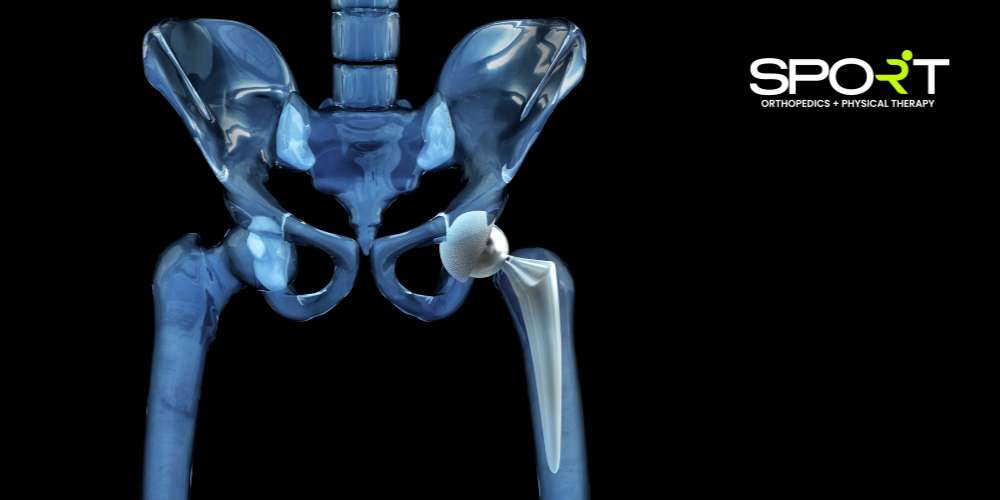
Before you undergo a major surgery, like hip replacement surgery, it can be helpful to know what the recovery process is going to look like. That’s why we’ve put together a comprehensive recovery timeline to help you understand the total hip replacement recovery week by week following your procedure.
If you are in need of a hip replacement, you need a surgeon who can provide you with skilled and compassionate care throughout every stage of the process. Luckily, the Dallas total hip replacement surgeons at SPORT Orthopedics + Physical Therapy are here to help. Contact us at (469) 200-2832 to learn more about our services and take the first step toward a pain-free and active lifestyle.

Below is a general guide of what the hip replacement recovery timeline might look like for you each week following your procedure. However, it’s important to note that hip replacement recovery time can vary from patient to patient depending on the type of replacement, whether it was a partial, total, or anterior hip replacement, and the surgical techniques used.
Additionally, the patient’s age, overall health, and the severity of their hip condition, like hip arthritis, osteoarthritis, hip fracture, or cartilage damage, can change the overall length of their hip replacement recovery period. Adhering to your care team’s instructions can ensure that you have a speedy recovery.
On the day of surgery, you will arrive at the hospital and check in for your hip replacement. After being prepped for surgery, you'll receive anesthesia to ensure you are comfortable and pain-free during the procedure. The surgery typically lasts a few hours, during which your damaged hip joint is replaced with a prosthetic implant.
After the surgery, you'll be taken to a recovery room where medical staff will monitor your vital signs as you wake up from the anesthesia. Once stable, you will be moved to your hospital room. Nurses will regularly check your vital signs, like pulse and blood pressure, and will help manage your pain with prescribed pain medications.
During that same day, you'll likely be encouraged to start gentle movements and deep breathing exercises to prevent complications. Later in the day, a physical therapist may visit to help you take your first steps with the aid of a walker or crutches. By evening, you'll be resting in your room, with hospital staff assisting you as needed to ensure your comfort and monitor your progress.
During the first 1 to 2 days after your hip replacement, you may remain in the hospital. Nurses will monitor your vital signs, manage your pain, and help you with daily activities. Physical therapists will guide you through exercises to begin regaining mobility and strength in your new hip.
Medical professionals will help you get out of bed, and you will need to use a walker or crutches to take short walks around your room and down the hallway. They may also have you wear tight compression socks over your feet, ankles, and calves. Increased movement will also help promote blood circulation and prevent serious complications like blood clots or deep vein thrombosis, promoting a safe, steady recovery.

By days 3 to 4 after your hip replacement, you may be discharged from the hospital if your recovery is progressing well. You’ll need a friend or family member to drive you home from the hospital and to care for you in the days and weeks following your procedure.
At home, you'll continue physical therapy exercises to improve your mobility and strength. You will likely be able to walk short distances with a walker or crutches, and your pain should be manageable with prescribed medications.
You'll also need to utilize modified ways to perform daily activities like going to the bathroom, putting your socks and shoes on, etc. You may also be asked to use a raised toilet seat for the first several weeks following your procedure to prevent your hips from bending too much when sitting.
Follow-up appointments will be scheduled to monitor your progress and ensure proper healing. During this time, it’s important to avoid strenuous activities and follow your healthcare provider’s instructions to promote proper healing.
One week after your hip replacement, you should be more comfortable moving around with a walker or crutches. Your pain levels should be decreasing, and you will continue your prescribed physical therapy exercises to regain strength and flexibility in your hip. You may still experience some swelling and discomfort, but these should gradually diminish.
In order to prevent infection, you will not be able to take a shower or bath until your staples have been removed, which will likely not be removed until the second week following your procedure. In the meantime, you will need to take sponge baths to clean yourself and the surgical site.
In the first week after hip replacement surgery, you can expect to gradually regain some of your mobility. You can also expect to be stiff and sore, but any pain and swelling you experience will be managed with medications.
Expect to continue your physical therapy exercises, which are designed to enhance your strength and flexibility. Over the course of the week, daily activities should become easier, and you should have an easier time moving around with the assistance of your walker or crutches.
Two weeks after your hip replacement, you should notice a significant improvement in your mobility and a decrease in pain and swelling. During this time, you will likely transition from using a walker or crutches to a cane for support. Physical therapy will continue to be an essential part of your recovery, focusing on increasing your range of motion and strength.
At this point, you will likely have a follow-up appointment with your medical team to have your staples removed. You should be able to perform more daily activities independently, but you should still avoid any physically demanding tasks to ensure you are healing well and on the path toward a speedy and successful recovery.
Typically, no. You will need to wait about 4 to 6 weeks after your hip replacement surgery before you can drive again. However, if you have recovered well and your surgery was only on your left hip, then your doctor may allow you to drive sooner than one month after your procedure. Always follow your surgeon's specific advice regarding when it's safe to resume driving.
Three to six weeks after your private hip replacement surgery, you should experience substantial improvements in mobility and a further reduction in pain and swelling. You may be able to walk with minimal assistance, and may be able to start walking without a cane.
You'll still see a physical therapist so your hip muscles can continue to strengthen and become more flexible. You will gradually be able to resume more light activities, but you should still avoid high-impact or strenuous tasks.
Your surgeon may also allow you to begin driving again at this point. You should also ensure that you are walking regularly to help reduce pain, increase strength, and improve mobility in your hip.
Three weeks after hip replacement, you should feel a noticeable improvement in your mobility as well as significant pain relief and reduction in swelling. You may still experience some discomfort and stiffness in your hip joint, but these should steadily decrease over time.
You should be more independent in your daily activities and may be transitioning from a walker or crutches to a cane. Continuing physical therapy exercises will be important to further enhance your strength and flexibility.

Between six to nine weeks after your hip replacement, you should experience significant improvements in mobility, with reduced pain and swelling in your new hip. While you may still have some limitations, you should be gradually returning to your normal daily routine.
Continue seeing your physical therapist and continue walking regularly, especially if you work a desk job or you tend to sit down for hours at a time. At this point, you should be able to walk freely without the use of a walking aid, but don’t be afraid to use assistive devices like a walking stick or cane if needed.
At 8 weeks after hip replacement surgery, many hip replacement patients still experience some minor aches and pains, though they should be diminishing over time. These residual discomforts can be the result of the healing process, general muscle fatigue, or soreness left over from physical therapy.
It’s common to feel stiffness or soreness in the hip area 8 weeks after hip replacement surgery, especially if you’ve engaged in any prolonged activity like walking. However, if you experience severe or worsening pain, swelling, or instability, consult your healthcare provider to ensure you are healing properly.
At the ten-week mark, you may only experience minor hip pain or stiffness following your hip replacement. You may have resumed many of your normal daily activities, though you should still avoid high-impact or strenuous tasks.
Physical therapy sessions may continue to focus on further strengthening your hip muscles and improving your overall range of motion and flexibility, but may also move more towards improving your balance and ability to bear weight on your new hip.
By twelve weeks post-hip replacement, most patients are able to fully return to normal activities. At this point, you may be able to discontinue treatment from any physical and occupational therapists you were seeing, but you should still continue to do exercises and participate in some kind of physical activity daily.
While you will be mostly healed at 12 weeks, it will likely take 6 to 12 months for you to make a full recovery. Continuing to adhere to medical advice and daily exercises can ensure that you heal as quickly as possible.
The recovery journey can look different for different patients depending on factors, like the patient’s age. Below are some recovery times for patients of different ages.
In general, a 60-year-old hip replacement patient should be able to mostly recover from the procedure within 2-3 months, and may make a full recovery within 6-9 months of the procedure. These patients may also be able to drive and perform light activities after 4-6 weeks.
At 70 years old, the hip replacement recovery time for a 70-year-old patient follows a similar trajectory to that of younger patients. Generally, it can take around 8 to 12 weeks for them to regain mobility and resume normal activities. However, a full recovery may take 6 months or more.
A 75-year-old hip replacement patient will likely need 9-12 weeks for their initial recovery, and 8 to 12 months for a total recovery.
At 80 years old, a patient may need about 10-12 weeks or more to heal from any serious pain, stiffness, or limited mobility from the procedure. However, it may still take a year or more for them to fully recover from the hip surgery.

After hip replacement surgery, certain precautions should be taken for the rest of your life to protect your new hip joint. These include avoiding high-impact activities such as running or jumping, being cautious when twisting or pivoting on the operated leg, and maintaining a healthy weight to reduce stress on the joint.
Normal pain after hip replacement surgery typically involves some level of discomfort, stiffness, and soreness around the hip and surgical site. This pain is usually most intense in the days immediately following surgery but gradually diminishes as the healing process progresses.
However, severe or worsening pain, especially when accompanied by other symptoms such as swelling or redness, may indicate a complication. If you experience any worsening hip pain, contact your medical provider and seek medical treatment.
After hip replacement surgery, there are certain activities and movements that should be avoided to prevent complications or damage to the new hip joint.
These include:
In general, most hip replacement patients can walk normally on their new hip joint within 3 to 6 weeks without the use of a walking aid. However, this can vary from person to person, and some patients may need more time before they have the strength to walk independently.
After a hip replacement, you will likely need to wait 4 to 6 weeks before you can drive again. Your healthcare team will be able to tell you when you are cleared for driving.
Similar to a hip replacement, it may take a hip fracture surgery patient 4-6 weeks before they can walk normally. This timeline can vary, however, and it may take some patients more time before they can walk without a cane or crutch.
In general, you should only need pain medicine for the first 3-6 weeks following your hip replacement surgery. Other pain management methods, like light exercise, can help ensure you continue healing while allowing you to come off of your pain medications.





When it comes to hip replacement surgery, finding the right surgeon can help ensure a successful outcome and a smooth recovery journey. At SPORT Orthopedics + Physical Therapy, our team is proud to offer hip replacements to the residents of Dallas, Plano, Frisco, and the greater area.In addition to hip joint replacement surgery, we also perform other hip surgeries, including hip resurfacing, hip labral tear surgery, and hip arthroscopy procedures. We also perform a variety of Texas orthopedic surgeries, including other joint replacement surgeries like ankle replacement, shoulder replacement, and knee replacement procedures.Ready to schedule your appointment with us? Call (469) 200-2832 or schedule an appointment with us through our website today.





*We accept most all insurance plans, if you do not see your plan listed above or have any questions, please contact our office.

SPORT Orthopedics + Physical
Therapy – Dallas, TX
Services:
• Clinic • Orthopedic • Urgent Care
• Physical Therapy
18152 Preston Road
Suite I-2
Dallas, TX 75252
Phone: (469) 200-2832
Fax: (469) 269-1074
SPORT Orthopedics + Physical Therapy
– Frisco, TX
Services:
• Clinic • Orthopedic • Urgent Care
• Physical Therapy
9255 Dallas Parkway
Suite I20
Frisco, TX 75033
Phone: (469) 200-2832
Fax: (469) 269-1074
SPORT Orthopedics + Physical
Therapy – Wylie, TX
Services:
• Clinic • Orthopedic • Urgent Care
• Physical Therapy
3400 FM 544
Suite 650
Wylie, TX 75098
Phone: (469) 200-2832
Fax: (469) 269-1074
SPORT Physical
Therapy – Prosper, TX
Services:
• Physical Therapy
790 N Preston Rd
Suite 60
Prosper, TX 75078
Phone: (469) 200-2832
Fax: (469) 269-1074
SPORT Orthopedics – Mesquite, TX
Services:
• Clinic
• Orthopedic
• Urgent Care
1102 North Galloway Ave
Mesquite, TX 75149
Phone: (469) 200-2832
Fax: (469) 269-1074
Due to the high volume of calls, we want to inform all patients and providers that our phones are only active during our open hours of 8:30 AM – 5:00 PM. The lines will not ring outside of these business hours or during our lunch break from 12:00 PM to 1:30 PM. For faster assistance, please text us at 469-200-2832. If you need to schedule an appointment, the most efficient method is to book online on this website.